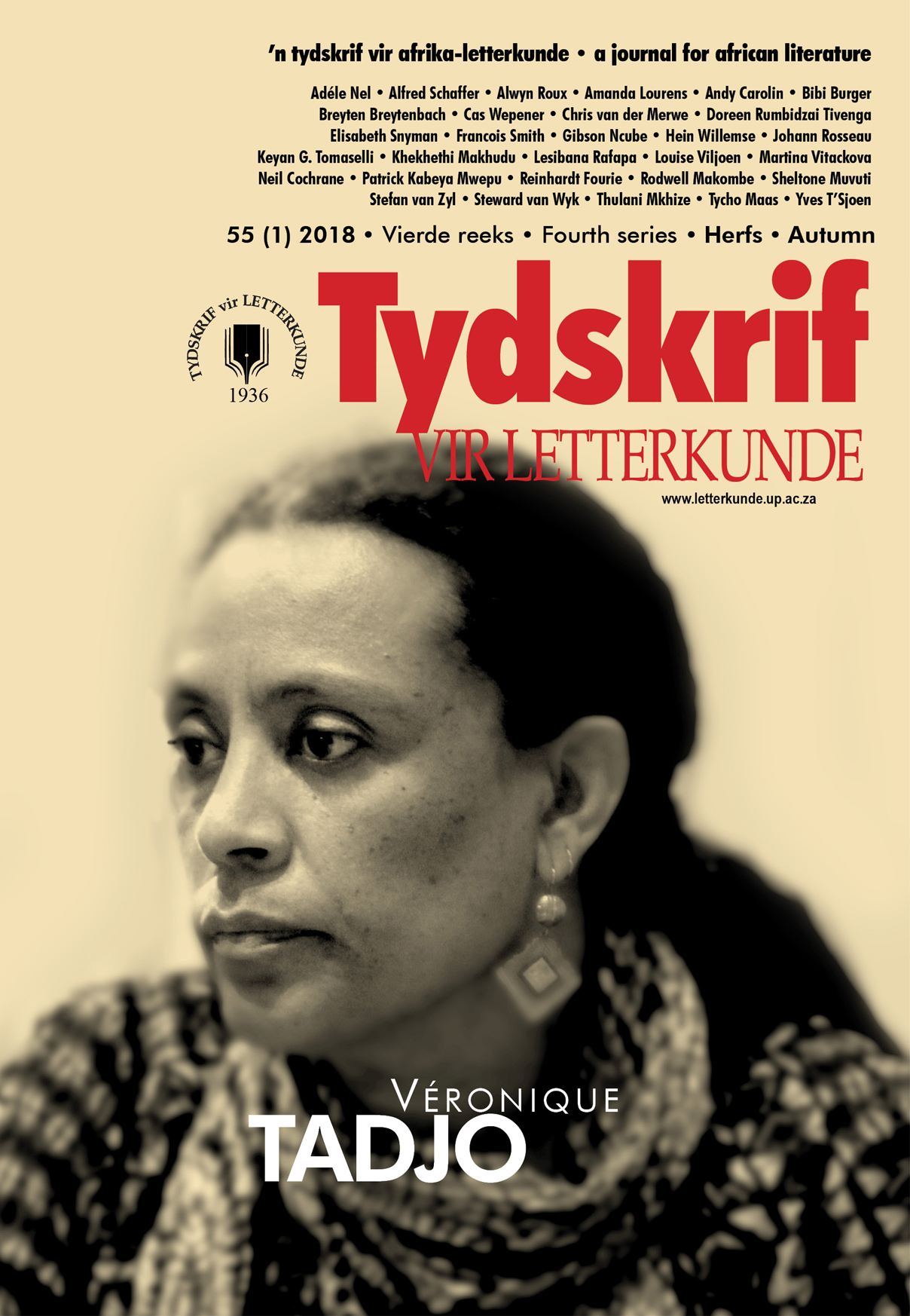Revisiting trauma and homo religiosus in selected texts by Mongo Beti and Véronique Tadjo
DOI:
https://doi.org/10.17159/2309-9070/tvl.v.55i1.1582Keywords:
Homo Religiosus, trauma, religiosity, genocide, Mongo Beti, Véronique TadjoAbstract
This paper locates religion within the literary narratives of traumatogenic experiences such as war and genocide as depicted in the novels The Poor Christ of Bomba by Mongo Beti and Véronique Tadjo's The Shadows of Imana: Travels in the Heart of Rwanda. In spite of evident reference to the role played by religion in traumatic and traumatising encounters, it features simply as a footnote to the ethnic tensions that underpin these encounters. Drawing on the theoretical work of Kurtz (2014) and other scholars as well as casting a glance at anticolonial and postcolonial Francophone literatures, this paper argues that trauma in modern postcolonial Francophone literature is ubiquitous. It reveals itself in the post-independence contradictions and injustices as depicted by modern francophone authors and thinkers whose subject matter is largely dominated by such motifs as corruption, war, violence, insanity, rape, poverty, disillusionment, which all accommodate a direct challenge to religion. The absence of religiosity in trauma literature suggests a reversal of the socio-historical stereotype that frames Africans as highly religious, and whose opposition to religion is a result of enlightenment through education.
Downloads
References
Beti, M. The Poor Christ of Bomba. Translated by Gerald Moore. Heinemann, 1971.
Briere, E. “Résistance à l’acculturation dans l’oeuvre de Mongo Beti.” Canadian Journal of African Studies, vol 15, no 2, 1981, pp. 181–99.
Caruth, Cathy. “Unclaimed experience: trauma and the possibility of history.” Yale French Studies, vol 79, 1991, pp. 181–92.
Cervigni, D. S. “Literature, religion, and the sacred.” Annali d’Italianistica, vol 25, 2007, pp. 11–22.
De Beer, A.-M. Le voyage de l’ecrivain vers une voix, une histoire et un futur–une etude du projet litteraire, Rwanda: Ecrire par devoir de memoire. Diss. U of Johannesburg, 2013.
De Maeyer, J. Religion, Children’s Literature and Modernity in Western Europe 1750–2000. Leuven U P, 2005.
Ehora, E. C. “Ecriture de la guerre et rhetorique de la violence dans le roman africain contemporain. L’exemple de l’Ombre d’Imana de Veronique Tadjo.” Ethiopiques, vol 88, no 1, 2012. http://ethiopiques.refer.sn/spip.php?article1824.
Erickson, G. The Absence of God in Modernist Literature. Palgrave Macmillan, 2007.
Fiala, A. “Militant Atheism, Pragmatism, and the God-Shaped Hole.” International Journal for Philosophy of Religion, vol
, no 3, 2009, pp. 139–51.
Freud, S. Beyond the Pleasure Principle. Standard Edition. Vol. 18. Translated by J. Strachey. Hogarth Press, 1920.
Gikandi, S. “African literature and the colonial factor.” The Cambridge History of African and Caribbean Literature, Vol 1, edited by F. Abiola Irele and S. Gikandi. Cambridge U P. 2004, pp. 379–97.
Gueye, A. “De la religion chez les intellectuels africains en France. L’odyssée d’un référent identitaire.” Cahiers d’Etudes Africaines, vol 41, 2001, pp. 267–91.
Kurtz, J. R. “Literature, trauma and the African moral imagination.” Journal of Contemporary African Studies, vol 32, no 4, 2014, pp. 421–35.
Mamdani, Mahmood. When Victims Become Killers: Colonialism, Nativism, and the Genocide in Rwanda. Princeton U P, 2002.
Mbembe, A. On the Postcolony. U of California P, 2001.
Mbiti, J. S. “Challenges facing religious education and research in Africa: the case of dialogue between Christianity and African religion.” Religion and Theology, vol 3, no 2, 1996, pp. 170–9.
McIntosh, D. N. “Religion-as-Schema, with implications for the relation between religion and coping.” The International Journal for the Psychology of Religion, vol 5, no 1, 1995, pp. 1–16.
Mortimer, M. “African literature in French: sub-Saharan Africa during the colonial period.” The Cambridge History of African and Caribbean Literature, Vol 1, edited by F. Abiola Irele and S. Gikandi. Cambridge U P. 2004, pp. 530–51.
Opoku, K. Asare. “Religion in Africa during the Colonial era.” The UNESCO General
History of Africa, Vol. VII: Africa under Colonial Domination 1880–1935, edited by A. Adu Boahen. Heinemann, 1985, pp. 508–38.
Olabimtan, K. “‘Is Africa incurably religious?’” Exchange, vol 32, no 4, 2003, pp. 322–39.
Oladipo, O. “Metaphysics, religion, and Yoruba traditional thought.” The African Philosophy Reader, edited by P. H. Coetzee and A. P. J. Roux. Routledge, 1998, pp. 200–8.
Salaka, S. La critique sociale dans l’oeuvre de Mongo Beti. 1982. U Lyon II, Thèse et mémoire.Samuel, K. Bearing witness to trauma: representations of the Rwandan genocide. 2009. U Stellenbosch, MA diss.
Sanni, J. S. “Religion: a new struggle for African identity.” Phronimon, vol 17, 2016, pp. 1–13.
Shinebourne, P. “Trauma and culture: on Freud’s writing about trauma and its resonances in contemporary cultural discourse.” British Journal of Psychotherapy, vol 22, no 3, 2006, pp. 335–45.
Tadjo, V. “Genocide: the changing landscape of memory in Kigali.” African Identities, vol 8, no 4, 2010, pp. 379–88.
Tadjo, V. The Shadows of Imana: Travels in the Heart of Rwanda. Translated by V. Wakerley. Heinemann Educational Publishers, 2000.
Toft, M. D. Religion, Rationality, and Violence. Columbia U P, 2011.
West-Pavlov, R. “Regardez La Vie Reprendre: Futurity in Véronique Tadjo’s L’Ombre d’Imana / the Shadow of Imana.” Tydskrif Vir Letterkunde, vol 51, no 2, 2014, pp. 114–29.
Wijsen, F. Seeds of Conflict in a Haven of Peace. Rodopi, 2007.
Downloads
Published
Issue
Section
License
Copyright (c) 2018 Tydskrif vir Letterkunde

This work is licensed under a Creative Commons Attribution-ShareAlike 4.0 International License.


 https://orcid.org/0000-0001-6465-6584
https://orcid.org/0000-0001-6465-6584


.png)